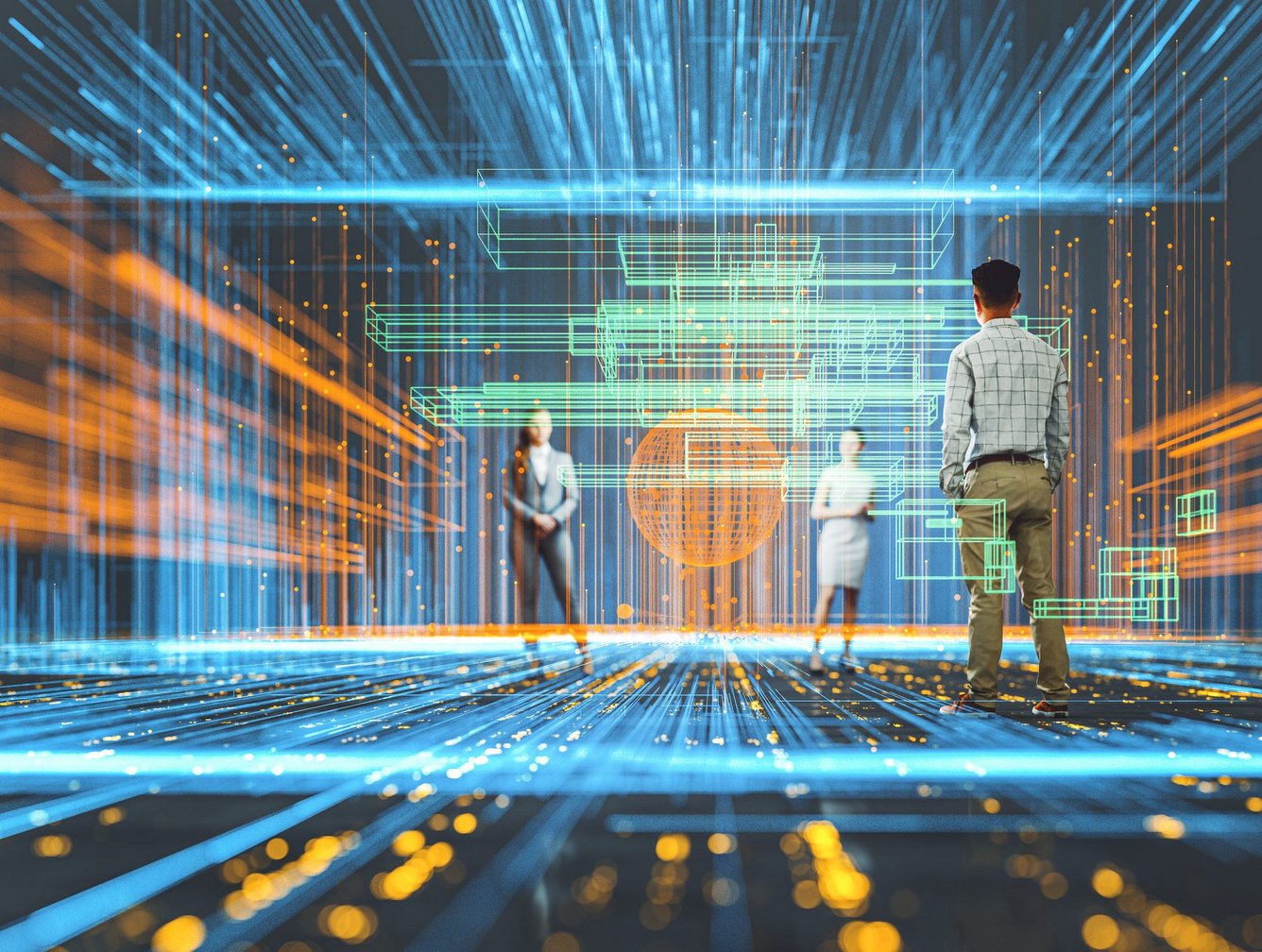
The Future of VR Economy – How Blockchain is Redefining Virtual Asset Ownership and Monetization
The need for virtual assets like avatars, in-game objects, and virtual property is rising along with the VR sector. However, traditional approaches to virtual asset ownership and monetization have been hampered by problems, including fraud, lack of transparency, and restricted market access.
In comes blockchain technology, a decentralized and open-source ledger system that opens up new avenues for VR commercialization and asset ownership. Blockchain enables the creation of markets devoid of intermediaries and manipulation where consumers may own their virtual goods.
To better understand how blockchain is changing virtual asset ownership and commercialization, this study will examine the future of the VR economy.
We will look at the present state of the VR economy, the function of blockchain in VR, the idea of tokenization in VR, decentralized VR marketplaces, the use of blockchain in VR gaming and eSports, as well as the newest trends and innovations that are influencing the direction of VR.
Ultimately, our goal is to shine a light on the revolutionary potential of blockchain in VR and offer advice to anyone wishing to take advantage of this promising new market.
The Current State of the VR Economy
Due to technological breakthroughs and rising demand for immersive experiences, the VR economy has gradually expanded in recent years. Here are some vital statistics and patterns concerning the state of the VR industry right now:
- Industry Size
- Applications
- Adoption
- Challenges
- Opportunities
Industry Size
According to a Statista analysis, the worldwide VR industry is anticipated to grow from 7.9 billion dollars in 2018 to 20.9 billion in 2025.
Applications
Virtual reality technology is employed in various fields, including gaming, entertainment, medicine, education, and training. Virtual reality’s primary application is gaming, where virtual properties and in-game goods are valued commodities.
Adoption
Many customers have yet to use VR technology. Therefore adoption is still in its early phases. However, as technology becomes more available and inexpensive, its usage is anticipated to rise.
Challenges
The VR economy confronts several difficulties, including high manufacturing costs, a lack of standards and regulations, and insufficient content. Problems like fraud and restricted market access have also hampered conventional approaches to virtual asset ownership and monetization.
Opportunities
With virtual assets becoming increasingly valuable, the VR economy offers several possibilities for value generation and monetization. Blockchain technology integration opens up a new route for profitable virtual asset ownership.
There is considerable development potential for the VR economy, which is currently in its early stages. The VR economy offers many prospects for value generation and monetization, albeit encountering many obstacles. The adoption of blockchain technology is anticipated to transform virtual asset ownership and monetization completely.
Importance of Monetizing and Owning Virtual Assets
In the digital era, virtual assets are becoming more valuable and significant. The value of virtual assets like avatars, in-game objects, and virtual real estate rises with the demand for virtual reality experiences and online gaming. For numerous reasons, it is essential to possess and profit from these assets:
- Value Creation
- User Engagement
- Security and Transparency
- Market Access
Value Creation
Virtual assets offer the potential for value creation and economic expansion. For example, selling in-game products for real money opens up a new revenue source for game producers and users.
User Engagement
By offering incentives for consumers to invest more time and money in VR experiences, virtual assets may raise user engagement. For instance, having exclusive access to virtual goods can give users a feeling of prestige and exclusivity, improving their overall pleasure.
Security and Transparency
In traditional centralized systems, where users must rely on intermediaries to handle their assets, ownership of virtual assets can be difficult. Blockchain technology offers a transparent, decentralized framework that lets users safely own and control their virtual assets.
Market Access
Access to new markets and possibilities may be made possible through virtual assets. To increase the reach and breadth of organizations and individuals, virtual real estate may be utilized for advertising, organizing events, and even holding virtual conferences.
The ownership and monetization of virtual assets are essential to developing the VR economy because they open up new possibilities for value generation, user engagement, security, transparency, and market access.
The Role of Blockchain in the VR Economy
Numerous advantages and solutions blockchain technology provides can enhance the virtual reality (VR) economy. The following are a few of the functions that blockchain might have in the VR economy:
- Secure and Transparent Virtual Asset Ownership
- Tokenization of Virtual Assets
- Decentralized Marketplaces
- Smart Contracts
- Fraud prevention
Secure and Transparent Virtual Asset Ownership
Virtual asset ownership that is safe and transparent is made possible by blockchain, which offers a decentralized and tamper-proof mechanism. Without the need for intermediaries, users may directly own and control their virtual assets, and transactions can be publicly monitored on the blockchain record.
Decentralized Marketplaces
Without intermediaries or Manipulation: Blockchain makes it possible to build marketplaces without intermediaries or manipulation. This enhances user experience by enabling greater transparency, reduced costs, and more direct peer-to-peer transactions.
Tokenization of Virtual Assets
Blockchain technology makes it possible to tokenize virtual assets, creating electronic tokens that reflect the ownership and value of these assets. These tokens may be exchanged on decentralized exchanges, opening up a new market for commercializing virtual assets.
Smart Contracts
Smart contracts are self-executing contracts that may automate different virtual asset ownership and monetization elements. Blockchain makes the usage of intelligent contracts possible. Smart contracts, for example, can automate the transfer of virtual assets following the completion of a sale, obviating the need for mediators and boosting efficiency.
Fraud prevention
Because blockchain is transparent and decentralized, it is more challenging to conduct fraud and manipulate virtual assets. Since transactions cannot be changed or deleted thanks to blockchain’s immutability, it offers a safe virtual asset ownership and monetization framework.
Blockchain technology has the potential to have a significant impact on the VR economy by offering solutions for safe virtual asset ownership, decentralized markets, tokenization of virtual assets, smart contracts, and fraud protection.
The VR economy may be redesigned using blockchain technology, offering a better user experience and more effective commercialization of virtual assets.
Tokenization of VR
The process of producing digital tokens that reflect the ownership and value of virtual assets in the virtual reality (VR) environment is known as VR tokenization. These tokens may be exchanged on decentralized exchanges, opening up a new market for commercializing virtual assets.
Blockchain technology, which offers a decentralized and hacker-proof method for producing, maintaining, and exchanging tokens, enables tokenization. The ownership and value of virtual assets, like in-game goods, virtual properties, and avatars, may be represented by digital tokens through the tokenization process.
VR developers and consumers may get various advantages by tokenizing virtual objects. First, tokenization makes it possible to build decentralized markets where users may directly purchase, sell, and exchange virtual goods without the involvement of middlemen. This results in lower costs, more efficiency, and improved user experience.
Second, tokenization makes it possible to hold a portion of virtual assets. Users can buy a bit of a virtual investment, allowing them to do so and gain from the asset’s rise in value.
Third, cross-platform asset ownership is made possible via tokenization. Virtual assets may be held and exchanged across various VR platforms thanks to VR tokenization, which boosts their value and liquidity.
VR tokenization opens up a new channel for commercializing virtual assets by facilitating the development of decentralized markets, fractional ownership, and cross-platform asset ownership. VR tokenization can transform how virtual assets are owned and sold by utilizing blockchain technology, giving VR developers and users more excellent value.
Decentralized VR Marketplaces
Decentralized virtual reality (VR) markets are digital platforms that allow for direct peer-to-peer trade of virtual goods without the need for intermediaries. These markets are based on blockchain technology, which offers a decentralized and unhackable mechanism for producing, maintaining, and exchanging virtual assets.
Decentralized VR markets are superior to centralized ones in several ways. First, they increase transparency since no central authority regulates the market and all transactions are publicly recorded on the blockchain ledger. This lowers the possibility of fraud and manipulation, making the trade of virtual assets safer and more reliable.
Second, since there are no middlemen involved, decentralized VR markets charge reduced costs. The market becomes more effective by making it easier for users to purchase, sell, and trade virtual goods.
Third, more direct peer-to-peer transactions are offered via decentralized VR markets, enabling users to communicate and transact with one another directly. As a result, the atmosphere for exchanging virtual assets becomes more social and community-driven.
Fourth, users may sell virtual goods between various VR platforms thanks to decentralized VR markets that support cross-platform commerce. As a result, virtual assets are more liquid and provide consumers and developers more excellent value.
Decentralized VR markets provide a new way to trade virtual goods since they allow for cross-platform trading, direct peer-to-peer transactions, and more transparency. Decentralized VR markets can transform the way virtual assets are sold by utilizing blockchain technology, offering a better user experience and more effective virtual asset monetization.
VR Gaming and eSports
A more realistic and engaging gaming experience might change the gaming and eSports industries thanks to virtual reality (VR) technology. Here are some ways that virtual reality is influencing eSports and gaming:
- Immersive Gaming Experience
- Enhanced Interactivity
- Additional Revenue Sources
- Growth of eSports
- Increased Accessibility
Immersive Gaming Experience
Gamers might feel as though they are actually within the game world thanks to VR’s immersive and realistic gaming experience. Players will have a more interesting and thrilling experience as a result, which will increase their happiness and enjoyment.
Enhanced Interactivity
Since players can physically engage with the game world using their motions and gestures, virtual reality (VR) enables more intuitive and engaging gaming. As a result, the game experience is more responsive and natural, giving the player a greater sensation of control.
Additional Revenue Sources
VR gaming and eSports offer game creators additional revenue sources, including the monetization of virtual assets, advertising, and sponsorships. Virtual reality (VR) allows for the tokenization of virtual assets, opening up new avenues for asset ownership and trade. Additionally, VR eSports competitions and events may draw sponsors and advertise, opening up new sources of income for the sector.
Growth of eSports
As VR offers a more immersive and spectator-friendly experience, it is predicted to propel eSports growth. VR eSports competitions may be televised live in 360 degrees, giving viewers a more participatory and entertaining experience. VR eSports can also draw in new participants and spectators, boosting the popularity and expansion of the sector.
Increased Accessibility
VR technology can increase accessibility so that those with physical or intellectual impairments can participate in gaming and eSports. Instead of using conventional controllers or keyboards, VR allows players to control the game with their own motions and gestures.
VR technology has the ability to completely transform the gaming and eSports sectors by bringing players a more immersive and participatory gaming experience, opening up new income channels for game producers, and enhancing accessibility for gamers.
We can anticipate even more inventive and fascinating breakthroughs in the gaming and eSports sectors as VR technology advances.
Future of VR Economy
Given how blockchain technology and virtual reality (VR) are continuing to develop and interact, the future of the VR economy looks bright. The following possible changes might have an impact on how the VR economy develops in the future:
- Increased Adoption
- VR Marketplaces
- Tokenization of Physical Assets
- VR eCommerce
- VR Social Spaces
Increased Adoption
As VR technology improves and becomes more widely available, we may anticipate seeing an increase in the use of VR across a range of sectors, including gaming, entertainment, healthcare, and education. This will open up new avenues for the ownership and commercialization of virtual assets as well as new sources of income for VR developers and content producers.
VR Marketplaces
Decentralized VR markets will become more and more well-liked since they offer a more open, effective, and democratic environment for exchanging virtual assets. Fractional ownership, cross-platform trade, and new revenue sources for developers and content producers will be made possible via VR markets.
Tokenization of Physical Assets
VR technology with blockchain technology can make it possible to tokenize physical assets like artwork, collectibles, and real estate. This will open up new avenues for trading in and owning assets, as well as new revenue sources for current asset owners.
VR eCommerce
Platforms for VR eCommerce will appear, allowing users to shop in virtual reality surroundings and buy both virtual and real-world goods using digital currency or tokens. As a result, consumers will have a more engaging and involved shopping experience, while online businesses will benefit from additional sources of income.
VR Social Spaces
VR social spaces will gain popularity, opening up new possibilities for the ownership and commercialization of virtual assets. Users will be able to design and personalize their virtual personas, buy virtual property, and organize virtual activities and events.
The VR economy has a bright future as blockchain technology and VR combine to offer fresh possibilities for virtual asset ownership and monetization. We can anticipate many more inventive and fascinating advancements in the VR economy as technology continues to advance.
Conclusion
New prospects for virtual asset ownership and monetization are being created by the convergence of blockchain technology with virtual reality (VR). Decentralization, transparency, and community-driven trade are made possible by the usage of blockchain in the VR economy, generating new sources of income for developers, content producers, and conventional asset owners.
The VR economy is anticipated to increase as a result of the adoption of VR technology across a variety of sectors, including gaming, entertainment, education, and healthcare. This will open up new possibilities for virtual asset ownership and monetization.
We can anticipate even more inventive and interesting advancements in the VR economy as technology advances, giving people a more immersive and participatory experience and opening up new revenue sources for businesses.





